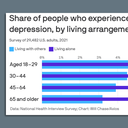Living alone linked to higher rates of depression

Living alone is linked to higher rates of self-reported depression than living with others, according to data released today from a 2021 National Health Interview Survey.
Why it matters: It's clear — even to Elmo — that many Americans are having a hard time and that the loneliness epidemic has become a major threat to their well-being.
By the numbers: 16% of U.S. adults lived alone in 2021, and 6.4% of them reported depression, compared to 4.1% of those who live with others — for both men and women, across most race and Hispanic-origin groups and by family income, according to the CDC.
- Adults who say they live alone and rarely or never receive emotional or social support were almost twice as likely to say they have feelings of depression, compared to those who never or rarely receive support but live with others.
- In the 45–64 age group, there was a significant disparity: 9% of people who lived alone compared to 3.9% of people who lived with others reported depressive feelings.
What they're saying: "It's not that living alone is bad for you, [but] there's something about living with another person that can create a little bit of a push to do habits that can improve your mood," says psychologist and "Stress Resets" author Jenny Taitz.
- For example, you might keep your home cleaner, put on fresh clothes more often and make regular small talk.
Yes, but: If you do live and/or work by yourself, Taitz recommends being mindful about your habits and how often you're talking to others.
One study conducted at a Starbucks highlights the power of casual conversation.
- Volunteers were divided into two groups: Group one was instructed to avoid unnecessary conversation, and group two was encouraged to engage in social interaction.
- The results: People who smiled, made eye contact and/or had brief conversations with the barista had more feelings of positivity and connectedness than those who were as efficient as possible.
Be smart: Connection doesn't have to be about the volume of interaction and number of friends, but "it's your mindset that there are people who care about me," Taitz says.
- One way Taitz recommends people get into a connected mindset is to sit down and make a list of all the people who you know are cheering you on, even from afar.
- "That can reduce your loneliness, [because] loneliness is about the perception that there's no one there for me."
What we're watching: The share of single-person households keeps increasing — from 13.6% in 1962 to 28.9% in 2022, according to CDC data.
Go deeper: Take the "opposite action" when you're feeling down